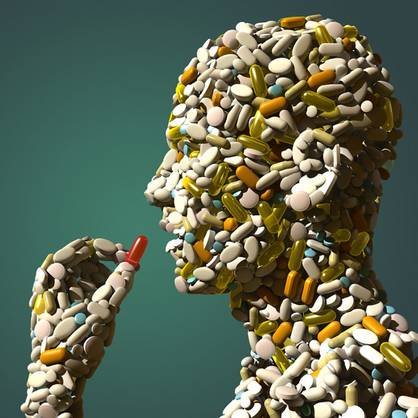Addiction & Compulsion
 Any activity, substance, object, or behavior that has become the major focus of a person's life to the exclusion of other activities, or that has begun to harm the individual or others physically, mentally, or socially is considered an addictive behavior. A person can become addicted, dependent, or compulsively obsessed with anything. Some researchers imply that there are similarities between physical addiction to various chemicals, such as alcohol and heroin, and psychological dependence to activities such as compulsive gambling, sex, work, running, shopping, or eating disorders. It is thought that these behavior activities may produce beta-endorphins in the brain, which makes the person feel "high." Some experts suggest that if a person continues to engage in the activity to achieve this feeling of well-being and euphoria, he/she may get into an addictive cycle. In so doing, he/she becomes physically addicted to his/her own brain chemicals, thus leading to continuation of the behavior even though it may have negative health or social consequences.
Any activity, substance, object, or behavior that has become the major focus of a person's life to the exclusion of other activities, or that has begun to harm the individual or others physically, mentally, or socially is considered an addictive behavior. A person can become addicted, dependent, or compulsively obsessed with anything. Some researchers imply that there are similarities between physical addiction to various chemicals, such as alcohol and heroin, and psychological dependence to activities such as compulsive gambling, sex, work, running, shopping, or eating disorders. It is thought that these behavior activities may produce beta-endorphins in the brain, which makes the person feel "high." Some experts suggest that if a person continues to engage in the activity to achieve this feeling of well-being and euphoria, he/she may get into an addictive cycle. In so doing, he/she becomes physically addicted to his/her own brain chemicals, thus leading to continuation of the behavior even though it may have negative health or social consequences.
Common Forms of Addiction & Compulsion
- Alcohol & Substance Abuse
- Cell Phone Use
- Checking, counting, repeating, and washing
- Compulsive Spending, Shopping
- Eating Disorders
- Exercise
- Gambling
- Hoarding
- Internet & Computer Use
- Pornography
- Procrastination
- Sexual Behavior
- Shopping
- Talking
- Tanning
- Trichotillomania (Hair Pulling)& Skin Picking
- Workaholism
Treatment
Treatment for addictive & compulsive behaviors must help provide clients with healthy coping skills and self-soothing techniques. Additional approaches include positive reinforcement, behavioral modeling, development of social support, help with goal direction, rewards, and enhancing self-efficacy. Psychodynamic or Insight Therapy is used to explore past traumatic experiences, relationships, attachments, and beliefs that may have provided an imprint (either consciously or subconsciously for self-destructive behavior.
Because addictions originate as coping mechanisms for stressful situations, self-soothing and other mindfulness-based interventions are extremely effective. These strategies are part of Dialectical Behavior Therapy (DBT). There is evidence that DBT is helpful for most alcoholics, addicts, eating disorders, and co-occurring conditions.
Medication can also be considered as a tool to treat the underlying anxiety, depression, or other chemical/medical issues which frequently drive attempts to self-medicate & self-soothe through illicit substances & behaviors.
 Call today for a free consultation
Call today for a free consultation